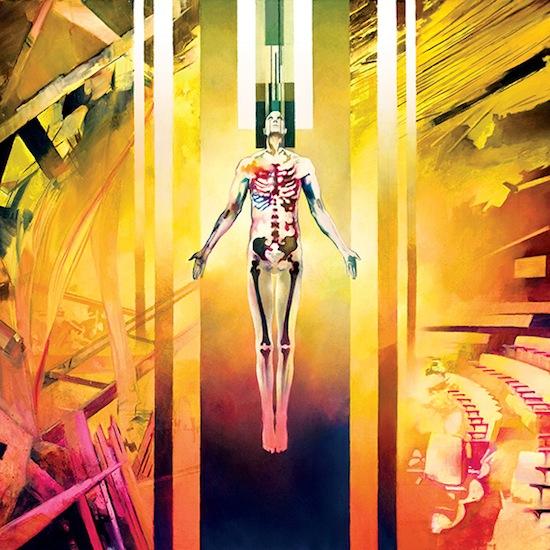Keeping track of the continual evolution of London-based post-everything-and-anything quartet Teeth of the Sea has been fascinating from the moment their emphatic debut, Orphaned By The Ocean hit the stores in 2010, amid much praise from the music press and none other than everyone’s favourite weirdo Julian Cope. The band instantly struck this reviewer as being a unique entity, with comparisons to other acts seeming ridiculous, and references to influences only painting part of a dramatic picture. The album mixed sparse noise with trumpet-driven psychedelia and hints of expansive krautrock-ish prog, but never coalesced into any of them, instead existing in a world of its own, one where grace and discord existed in a troubled harmony (of sorts).
From that impressive starting point, Teeth Of The Sea have continued to challenge themselves, refusing to drop into the kind of self-satisfied comfort zone that blights so many “rock” bands. And with Master, they’ve made their biggest leap forward yet, with the band members leaping across genre divides with a confidence and sure-handedness that shows them at the peak of their powers. With casual boldness, they embark on something approaching a concept album centred around a theme seemingly lifted out of the world of Philip K. Dick-style psychedelic science fiction. Despite rarely using lyrics, Teeth of the Sea manage to recreate a mind’s-eye view of a world in which humans and machines have become intermingled, perhaps perversely. This sentiment is echoed in the cover art, featuring an x-rayed man soaring skywards through a garishly-coloured neon sky. It’s spectacular, yet somehow unsettling, an LSD-fuelled vision of a chaotic future; and it’s one that filters throughout Master‘s nine tracks.
When I first heard some of the material on Master at a concert last year, I was staggered at the new direction Teeth Of The Sea were taking. Jimmy Martin’s instantly-identifiable guitar roar was scaled back, shimmering synth lines dominated, and Mat Colegate drove the set with martial drum beats taking in krautrock and techno simultaneously. It was thrilling, an absolute rush, but quite a curveball. Master ties past and present together more neatly, coming on as a heady cocktail of rhythmic electronica, heavy rock and gnarly Van Der Graaf-like progressive rock. After a brief opening snippet, the album kicks in righteously with ‘Reaper’, a soaring, emphatic track that borders on the anthemic. The band pile up the synth riffs and hypnotic beats, melding electronic and acoustic until the two become a single organism, a musical cyborg marching resolutely onwards and upwards. The rhythm, so sharp and repetitive, brings to mind the kind of thing Martin Hannett would have deployed with a Linn drum machine on The Human League’s Dare! in 1981, and yet, having seen Colegate in action, I can testify that the man has the kind of metronomic rigour to match any machine. As the synths build up in Moroder-esque layers, Martin drops in fuzzed-out non-riffs that snake and swirl around the main melody like digital static.
‘The Servant’ outlines the album’s psychic universe, as an emotionless, looped voice intones moodily about "November in what remains of the city" over brooding digital hiss and distant horn moans. ‘Black Strategy’ picks up where ‘Reaper’ left off with driving rhythms, although its pace is more redolent of mid-period Cabaret Voltaire than vintage Moroder, the atmosphere emphatically established as one of sombre dystopia. The track bleeds into ‘Pleiades Underground / Inexorable Master’, on which Martin treats himself to some molten doom-inflected riffs and fuzzy feedback. As the album evolves, Teeth of the Sea pull in strands of influence ranging from Throbbing Gristle to the darkened dub of a Raime or Dalhous, with the emergence of the trumpet adding a distinct sense of melancholia and unease.
The album ends on a truly emphatic note with the rapturous ‘Responder’, ten minutes of bliss that evolves from slow-burning, broiling noise textures into a floor-pounding dancefloor epic buoyed by an infectious back-beat and raucous trumpet blasts. With its gnarly opening and sweeping final segment, it neatly condenses the various moods, textures and sounds of Master into one track, signing off on the highest of peaks. If Fuck Buttons hadn’t gone stadium-sized, and instead expanded on the brittle edges of their superlative debut Street Horrrsing, they might have ended up sounding as weird, majestic and abrasive as Teeth of the Sea do on Master. One thing’s for sure: these tracks probably won’t end up soundtracking a major sports event.


